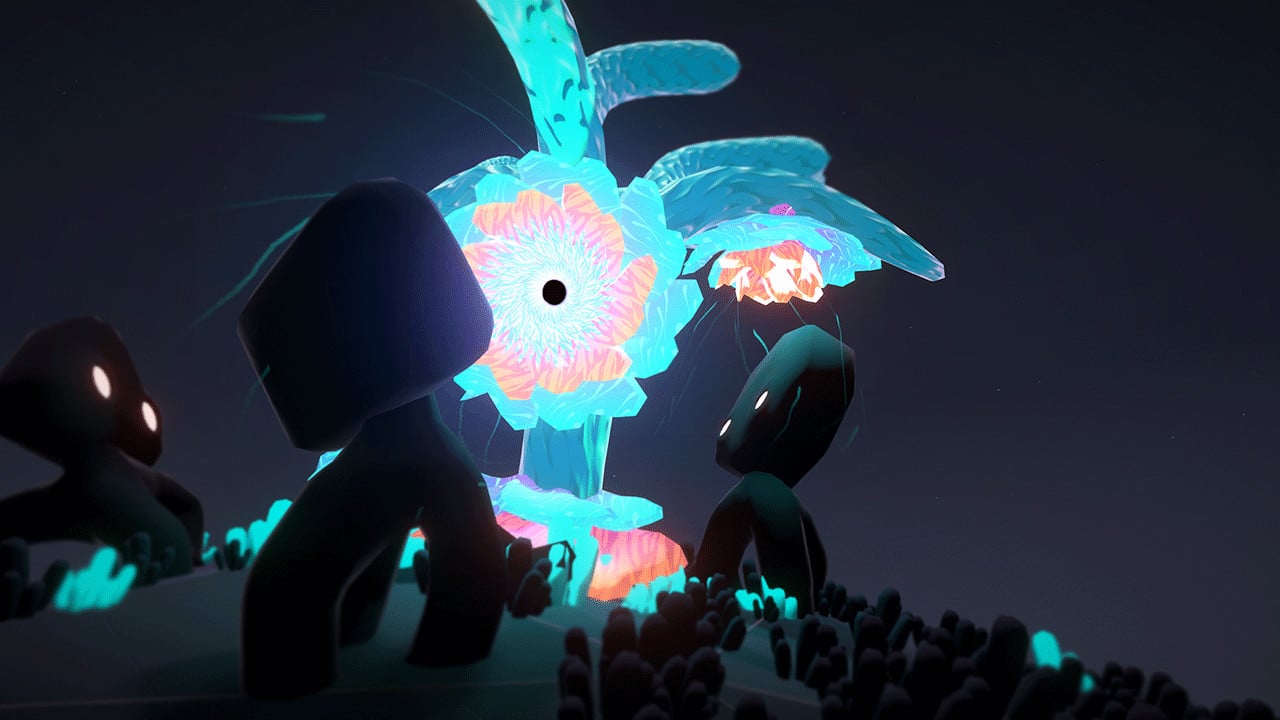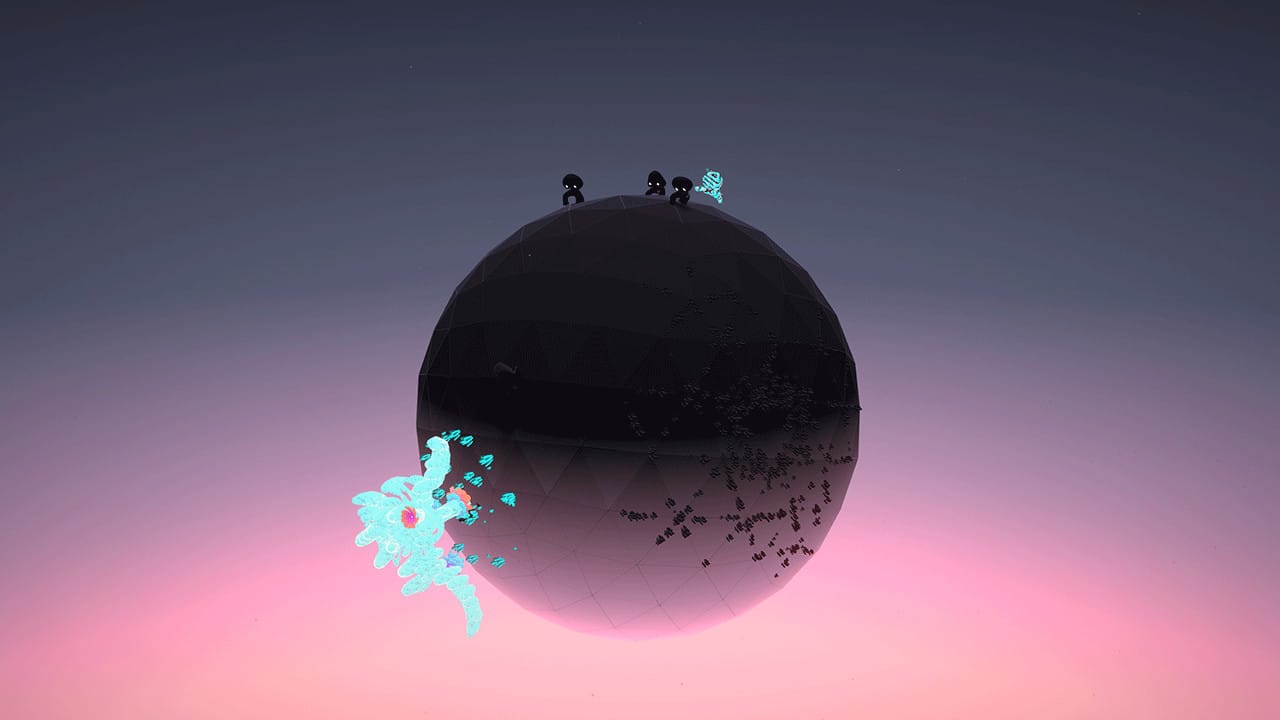While speaking to Pietro Gagliano of Transitional Forms and David Oppenheim of the NFB about their new VR film, Agence, Gagliano streams the piece itself. I watch as he toys with the small group of lifeforms named Agents that curiously ramble around a tiny planet.
They’re odd three-legged things that go from goldfishing their way from one side of their tennis ball-sized existence to another to staring at me in bemusement to accidentally – and then angrily – bumping into each other. When the call ends, Gagliano – perhaps unknowingly – leaves the stream going for another 10 or so minutes. I sit, slightly transfixed, continuing to observe the Agents that go on existing in the absence of their newfound virtual deity. It’s a little like discovering life under a microscope.
Agence is a hard thing to pin down. Gagliano, the piece’s director, and Oppenheim, the creative producer, label it as a ‘looping’ and ‘dynamic film’, something that starts right back up again the moment it ends. Every cycle, you can either care for, neglect or straight-up murder the group of five beings that populate the new planet. It’s a little like a god sim, though one that’s more concerned with morality than resource-building. But here’s the really interesting thing: Agents can learn as they exist. You can set some or all of the group to essentially become free-thinking agents with few set parameters on how to act. They’ll also observe and remember their actions, creating data that Transitional Forms can then implement into later builds of the experience to expand upon their creature’s behaviors.
Say you experience three or four cycles, which end either when no Agents are left or other events occur. The Agents you set to learn from these experiences will pass that data back to Transitional Forms and, when you revisit the piece later down the line, you may find the creatures learning from their past actions. Gagliano refers to any interactions you choose to make as ‘interfering’. “You don’t have to engage because we wanted to use as much filmic language as possible, but you can interfere,” he says.
Meanwhile, the agents that retain the “game AI”, as Gagliano calls it, will continue to “carry the story”. “We’ve designed them to behave in a variety of ways,” he explains. “And it still can be pretty chaotic in terms of like how they react to certain things. Chaotic in a good way.”
The point, the pair say, is to create experiences unique to the player that will continue to grow over the course of Agence’s life. “You can really lean into the interactivity or you can be more of an observer,” Gagliano says. “But regardless, as soon as you influence the planet, in some way, it starts to unravel a particular storyline that’s kind of unfolding in a simulation just for you.”
“And so the intention is that, when we launch, we will, continue to train brains, observing how people are playing through the dynamic film, and then continuing to train brains,” Oppenheim adds. “We’ll also be opening up our tools to the machine learning community to work with us, to train brains that will then be put back into the film.”
Right now, then, there’s a fairly small but fascinating range of options. Left to themselves, Agents may start picking on each other and starting fights amongst the group, retaliating with an aggressive body slam every time they’re wronged. You could pick them up and separate enemies by keeping them away from each other, or find the original culprit and banish them to the abyss below by simply dropping them off the planet. You also have the power to plant flowers that appear to hypnotize curious onlookers, eventually sowing their roots across the planet and claiming its earth as its own.
Not only are Agents learning from these experiences, but it also gives the movie a different message each time you watch it. You could play the role of a protector and stop any bullying, or consider the environmental impacts of creating new plant life that wars with the planet’s existing occupants, for example. As the Agents become more obsessed with the plant, it assumes more control of the planet, potentially creating catastrophe within the community.
“We’ve had people respond from an environmental point of view, from a discrimination point of view from a discovery point of view. Like this, this flower we’ve, we’ve nicknamed it, the MacGuffin after the Hitchcock term,” Gagliano explains. “And we’ve, we’ve kept it very archetypical if that makes sense. And so it may mean something very different to you than it does to David, for example.”
At the heart of it, there is a pretty compelling deeper narrative that runs through every cycle you experience. “Their world has been changed by you,” Gagliano says. “And what we’re trying to do there is a evoke some sense of responsibility for engaging with this planet and trying to improve their existence, but it’s hard to know what will happen.”
He later hits the core point: “Just because you can do something, doesn’t mean that you should.”
And that’s already working to some degree. The pair say they’ve seen lots of people adopting the role of a guardian in playthroughs. In fact Gagliano’s mother never left the first world – she spent 45 minutes separating fights and making sure everyone was safe.
It’s that core thread creating those different storylines not just in a binge gameplay session, but over the course of weeks and months that makes Agence so fascinating. Transitional Forms as a team plans to keep updating the experience with new brains every two weeks or so, but Gagliano also hopes opening the platform up for other engineers to experiment with will create new situations he hadn’t previously envisioned. It also speaks to the emerging narrative of AI’s importance and evolution in the world today. Today, we’re caring for little critters just trying to find their place on a minuscule planet. Tomorrow? “They may be superior in intelligence to us,” Gagliano theorizes. “Not these ones but AI [in general]. And now is the time to start really relating to this artificial life that never asked to be born in the first place that we are responsible for as humans.”
It’ll be intriguing to watch Agence evolve alongside that narrative, whatever scale it reaches. In the near-term, though, I’m just looking forward to hearing about new possibilities within its diorama worlds. “As a director, I’m really looking forward to the new behaviors of the AI creatures to shape the narrative in a new way and surprise,” Gagliano adds. “And we’ve already been surprised by certain things that they do and new storylines that unfold. And that’s really exciting.”
I can’t help but agree. In fact, I’m looking forward to making a little good chaos, myself.
Agence comes to SteamVR today for $2.99 and also supports non-VR and mobile play.




























